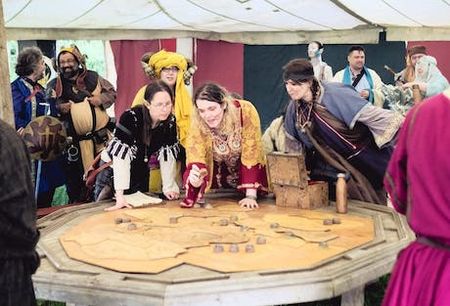General
Overview
Each Army is commanded by a single general - a new title is automatically created when a new army is created. A general is usually selected by the senators of their nation but once appointed they have sole authority for issuing commands to their army. They also have a voice and a vote in the Military Council allowing them to influence the use of the major conjunctions of the Sentinel Gate.
Responsibilities
Each general is responsible for the Imperial army they command. They have the absolute final say on the orders that army will receive. It is common for a general to cooperate with other members of the Military Council, particularly other generals of their nation, but they are under no requirement to do so.
As a member of the Military Council, the generals shoulder a portion of the Council's responsibility for conducting military campaigns against the enemies of the Empire - claiming new territory, protecting the borders and wielding the martial might of the Empire to the best of their ability. This places any general in a difficult position as they must balance national interests with the constant clamour to put the Empire first.
As part of the Council, they have the power to determine how the conjunctions of the Sentinel Gate are employed. This important responsibility includes selecting an Imperial citizen to act as Field Marshal providing leadership to all the Imperial forces that take the field. Although technically any Imperial citizen may be appointed as Field Marshal to lead on the battlefield, in practice the honour usually falls to a member of the Military Council.
A successful general must manage the political pressures of their appointment with a keen strategic mind and a natural affinity for leadership on the battlefield. It is widely considered one of the most difficult jobs in the Empire. Some generals take advantage of the challenge to pave the way for a successful career in the Senate, or even climb their way to The Throne on the back of successful campaigns and carefully gathered allies. Others retire from public life, haunted by their failures and accusations of incompetence.
Powers
Member of the Military Council
Each general is a member of the Military Council. They can participate in discussions, vote on matters of importance, and add items to the agenda for a Council session.
Command of an army
A general commands a single Imperial army, drawn from volunteers from their nation. Once a general is given their command, they have sole authority to order the army to move or attack as they choose. Traditionally the generals of one nation will cooperate but it is not a requirement and a general is within their rights to give orders as they see fit.
The military command structure allows an Imperial general to submit and carry out orders which breach Imperial law. If a general submits order to attack a foreign nation - or even an Imperial nation - then the order will be carried out in the coming season. Any legal consequences for these actions will occur at the next summit. Although historically such actions are rare, they are not unknown - the most famous being the orders issued by Imperial generals to attack and destroy key libraries and stores of knowledge during the reign of Emperor Nicovar.
The civil service provide each general with a report on the state of their army at the start of each summit. The briefing covers the current strength and location of the force; the details of any campaign the army was involved in; and a description of casualties incurred or additional troops recruited. Newly appointed generals can request a copy of this briefing from the civil service; the Herald of the Council is in the best position to provide one but any civil servant should be able to help.
A general issues orders to their army during the summit, on a paper that must be provided to the Herald of the Council. Formally only the Herald accepts orders, but in practice the orders are usually collected by the Imperial Auditor Gerard La Salle. Other civil servants will usually decline to accept military orders.
Orders cannot be legally submitted until after the opening of the final Military Council session. The Herald (or the Auditor acting on their behalf) may accept the orders before then if they choose - but that does not mean they have been legally submitted. The orders will be kept until the start of the final council session and announce at that point if they have received any orders.
This start of the council represents the final chance for the Synod (through revocation) or for the Throne (through Defender of the Empire) to prevent a general from submitting orders. Once orders have been formally submitted to the Herald after the start of the final council session, they cannot legally be changed in any way.
Customarily, generals have benefited from advice and support of the people of their nation when submitting orders. Although the final decision lies with the general, securing support from the armed forces controlled by individual captains can mean the difference between success and failure for a campaign. The egregores often helped arrange these meetings, although some nations organised semi-formal meetings to discuss matters (the thorns of Navarr for example, or the boyars of Varushka). Although not formally part of the Military Council, these meetings to discuss national strategy were traditionally held during a Senate session to uphold the spirit of the Imperial Constitution which forbids senators from involving themselves in military affairs.
This tradition fell out of favour only recently - during the reign of Emperor Walter the incompetent incumbent saw these meetings as opportunities for his toadies and agents to interfere in the military business of the individual nations. Empress Britta encouraged the nations to restore the tradition, although she personally preferred to lead the generals and the nations through personal charisma. Now that the turmoil after her death has died down, there are voices suggesting that a return to the historical state of affairs is the wisest course of action.Appoint an Adjutant
Because of the dangers facing an Imperial general, they are granted the power to appoint an adjutant. An adjutant operates under the same legal restrictions as a proxy, with one notable exception. If the general who appointed an adjutant dies, then their adjutant automatically assumes the legal powers of their general. This situation helps to reduce the chance that the Empire might find itself with no-one to command its armies.
The adjutant serves in this fashion until a new general is appointed. It is important to note that a new general can be appointed (by unanimous decision of a nation's senators or by a motion in the Imperial Senate) at any time, and immediately replaces the adjutant. If the general leaves office for other reasons, such as revocation, a writ of excommunication, or the end of the late general's term, the adjutant's service ends there and then. The Synod can still revoke or excommunicate the deceased general. If they do, the adjutant loses their position immediately.
While the adjutant can wield the legal powers of a general, they do not have the magical quality of Dominion. As such, an adjutant cannot be used to focus the power of ritual magic on an army regardless of whether the general is alive or not.
Because of the more formal nature of an adjutant, it is common for generals to work closely with the adjutant and to introduce them to the Military Council, so that the Herald and other generals can identify them. In addition some generals have found it effective to share some of the responsibilities of their title with their adjutant, particularly those areas they do not enjoy handling. An experienced general might appoint an adjutant who can lead from the front; a general more concerned with leadership on the battlefield might appoint an adjutant to handle the political pressures and challenges of strategic planning.
Historically, a common use for adjutants is to ensure that orders are still issued to the general's army if the general is killed. If a general and one or more of the senators who appointed them are both killed on the battlefield then it may be difficult to appoint a replacement in time. By appointing an adjutant, the general ensures that someone is still legally able to submit orders. Of course, adjutants who take the battlefield with their general could also be killed - but it is perfectly legal for a general to give a citizen authority to take over in the event that them and their adjutant are killed.
As generals appoint an adjutant, they may not also appoint a proxy.
Role of the Adjutant
Many generals treat their adjutant as either an apprentice or as a political appointee, choosing a candidate whose support can buttress their own. But the role has been used in many ways through the Empire's history, Empress Varkula was particularly known for "encouraging" newly appointed generals to adopt their predecessor as an adjutant to advise them, at least where the general was favoured. Perhaps the most infamous use was by General Nadia, dread Boyar of the Black Hills, who appointed the brilliant but maimed wise one, Vuk Enakov. Vuk successfully appeared before the Synod in place of Nadia to defend more than a dozen high profile Inquisitions.Appointment
Generals are normally elected on the anniversary of the creation of the army they lead. Each title is a national position appointed by the Senate. Under normal circumstances it will be appointed by unanimous vote of all of the Senators of the appropriate nation.
Only a citizen of the appropriate nation may be appointed as a general of an army from that nation.
All general positions that are due to be elected during a summit immediately become vacant at 6pm time-in Friday. Adjutants lose their position also at this time. The senators can inform the Overseer of Imperial Elections (a member of the civil service) of their unanimous decision as to the new general at any point after this. There is no deadline for the elections, but the muster provides an impetus to declare who the general is in a timely fashion. If a senator position is vacant or a senator is not present (and nor is their proxy) then they will be unable to appoint their General until resolved.
A general serves until the next election for the title. A general can be revoked by the General Assembly, the appropriate National Assembly, and by the Assembly of the Nine
Admiral
Apart from the fact they command an navy rather than an army, and thus issue different orders, an admiral functions in all ways as if they were a general. At this time there are no Imperial admirals following the destruction of the Freeborn Storm, the Brass Coast navy.
Further Reading
Core Brief
- Military Council Overview
- Muster
- Council Session
- Powers of the Imperial Military Council
- General
- Army
- Navy
Additional Information
- War
- Council Address
- Appointments to the Military Council
- Imperial Roll of Honour
- Appointments by the Military Council
- OOC Design

